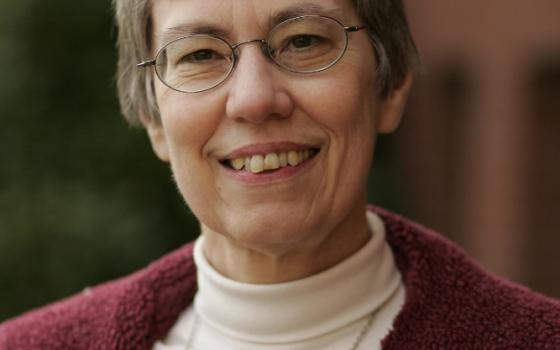Benedictine Sr. Angela Hoffman [< click for a video] thinks there’s a chance plants and fungi could provide a natural cure for cancer. She hasn’t found anything yet, but as a biochemist and professor at Portland University, she – along with her research students – continues to log hours in the lab looking.
Earlier this month, the 2014 Oregon Academy of Science award [see p. 9 for a list of her accomplishments] winner for outstanding higher education in science and mathematics spoke to Global Sisters Report about her work.
There are a lot of reasons why one would want to find a cure for cancer. What’s your motivation?
Because nobody knows the answer. And because it's really interesting; it's easy to get students motivated to want to do it. I don't know what I'm doing half the time – and that's fun. It's really weird, but I find that if people really think they know what they're doing, they don't take chances. If you don't take chances, you don't discover things. So, you discover more, I think, when you're in a little bit over your head, and that's pretty much where I am all the time.
Why are you focused on finding a natural cure?
I would rather have the plant or the fungus do all the organic synthesis stuff because plants and sunshine make some really unique molecules that people haven't thought of before. About 70 percent of the medicines that are used today – that are mainstream medicines – were either inspired by or based on natural products.
And do you have any leads?
We're looking at plants and sunshine, mostly. We're hoping to find something that will kill cancer cells, of course, without killing the organism that has the cancer – because there are a lot of things that are toxic and certainly can kill cells, but you just want to kill cells and not the organism. So we're looking for anything that we can isolate from plants or fungi. It's sort of like you're making tea, and then you're trying to figure out what's in the tea. So we do a lot of extractions, and then we try to purify the stuff that's in the extract.
That’s fascinating and, I think, a real testament to the power of women in the sciences. A lot of people these days are talking about the ways young girls are discouraged from pursuing careers in science. Is that something that happened to you? Is it something you think a lot about now as an educator?
For almost all the science courses that I took in college, I was one of the only female people there – or the only one. And that's okay. In one class a teacher said, "Well, there'll be one or two that won't make it," and looked right at me. So, I think you've got to be a little bit better than the guys. You have to put more time and effort into it, otherwise they won't take you seriously. I personally don't care if they take me seriously, but I don't want somebody to discount my students' work, so I try to be better.
I really do think that girls are at least as good at this as guys are. And so I usually overload my research students on the female side on purpose – because a lot of times girls don't get the opportunities that guys get, and they don't always think they can do it as well. Some people think science is supposed to be for guys. It's not true! Some of my more careful students are actually girls, and they actually discover more because they're more willing to put their time into it.
What advice would you give to a girl who’s being discouraged from science career?
I would say, if you care about it, go for it. It doesn't really matter if other people think it's a good thing.
[Dawn Cherie Araujo is staff reporter for Global Sisters Report based in Kansas City, Missouri. Follow her on Twitter @Dawn_Cherie.]

